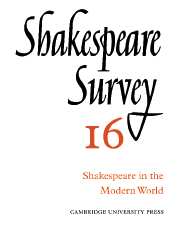Book contents
- Frontmatter
- An Obligation to Shakespeare and the Public
- Our Closeness to Shakespeare
- The Popularity of Shakespeare: An Examination of the Royal Shakespeare Theatre’s Repertory
- Shakespeare and the Fashion of These Times
- An Approach to Shakespearian Tragedy: The ‘Actor’ Image in Macbeth
- Shakespeare’s Impact Today in France
- Shakespeare and the Modern World
- Modern ‘Theatrical’ Translations of Shakespeare
- Shakespeare as ‘Corrupter of Words’
- Shakespeare in Ghana
- ‘Timon of Athens’
- Who Strutted and Bellowed?
- Shakespeare in Planché’s Extravaganzas
- ‘Our Will Shakespeare’ and Lope de Vega: An Unrecorded Contemporary Document
- Shakespeare and the Mask
- International Notes
- Shakespeare Productions in the United Kingdom: 1961
- Acting Shakespeare Today. A review of performances at the Royal Shakespeare Theatre, August 1962
- Canada’s Achievement
- 1 Critical Studies
- 2 Shakespeare’s Life, Times and Stage
- 3 Textual Studies
- Books Received
- Index
- Plate section
An Obligation to Shakespeare and the Public
Published online by Cambridge University Press: 28 March 2007
- Frontmatter
- An Obligation to Shakespeare and the Public
- Our Closeness to Shakespeare
- The Popularity of Shakespeare: An Examination of the Royal Shakespeare Theatre’s Repertory
- Shakespeare and the Fashion of These Times
- An Approach to Shakespearian Tragedy: The ‘Actor’ Image in Macbeth
- Shakespeare’s Impact Today in France
- Shakespeare and the Modern World
- Modern ‘Theatrical’ Translations of Shakespeare
- Shakespeare as ‘Corrupter of Words’
- Shakespeare in Ghana
- ‘Timon of Athens’
- Who Strutted and Bellowed?
- Shakespeare in Planché’s Extravaganzas
- ‘Our Will Shakespeare’ and Lope de Vega: An Unrecorded Contemporary Document
- Shakespeare and the Mask
- International Notes
- Shakespeare Productions in the United Kingdom: 1961
- Acting Shakespeare Today. A review of performances at the Royal Shakespeare Theatre, August 1962
- Canada’s Achievement
- 1 Critical Studies
- 2 Shakespeare’s Life, Times and Stage
- 3 Textual Studies
- Books Received
- Index
- Plate section
Summary
To assert that Shakespeare’s position in the world of literature is universal and unique is to utter a commonplace. To assert that his significance as a writer and dramatist is increasing in our world, despite the divisions and difficulties of modern society, is also to reiterate what we all know and are constantly saying. The very convening of this distinguished body of scholars from many nations is proof of Shakespeare’s importance in the cultures of each of our countries. We do not need to belabour the point that Shakespeare is of enormous interest to the peoples of every continent. But perhaps it might be profitable for us to contemplate for a few moments the problems, the responsibilities, and the obligations that this vast interest imposes upon us, an accredited body of scholars, whose presumed duty it is to make Shakespeare better understood and appreciated by the multitudes who read him or see his plays acted on the stage.
Since I represent the Folger Shakespeare Library, I inevitably find myself in the role of a kind of broker of information, and it is in that capacity that I, seeking help, want to appear before you. Like any other type of broker, whether his stock-in-trade is shares on the exchange or tangible commodities, we at the Folger have clients and customers who are inquisitive and clamorous for information. Some of our clients are professional scholars like yourselves; some are teachers; some are students; a surprising number can be classified as the general public. They are concerned with Shakespeare and his meaning on various levels of understanding. And they all ask questions that we find it hard to answer.
- Type
- Chapter
- Information
- Shakespeare Survey , pp. 1 - 9Publisher: Cambridge University PressPrint publication year: 1963



